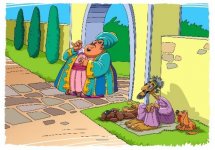THE PARABLES
THE PARABLES
The Rich Man and Lazarus Luke 16:19-31
The Rich Man and Lazarus Luke 16:19-31
He replied to him, 'If they do not respond to Moses and the prophets,
they will not be convinced even if someone rises from the dead.'
Luke 16:31, The NET Bible
they will not be convinced even if someone rises from the dead.'
Luke 16:31, The NET Bible
Context: The setting shows that the proud, “rich man” Pharisees were listening and sneering, but their final place would be torment in Hades. Lazarus was “flung down carelessly” (Wuest), eating whatever dropped from the rich man’s table, perhaps hunks of bread that the rich man had wiped his hands on. Lazarus’ final resting place became the favoured bosom position of Abraham. Even in his Hades state the rich man continued to boss Lazarus around, asking for Lazarus to be sent to his brothers.

Meaning: Some view this story as a historical narrative, in that the wicked will suffer a literal fiery punishment in the next world. But it is always dangerous to erect a theology or doctrine based on a parable. Others consider the parable to be prophetic of the outcome to the “rich man” Pharisee class contrasted to that of the “Lazarus” group of disciples. A third alternative is to see Jesus using parody to show the ironic outcome of the Pharisees’ distorted views which led them to ignore the present needs and suffering of the poor. Regardless of which view you hold, the key question to ask is, ‘what was the underlying sin of the Rich Man?’ It was the sin of building his identity on things other than the Lord. The rich man’s identity was marked by self-centredness and self-righteousness (Luke 16:14-15; Rev 3:17). This resulted in his merciless condemnation of outsiders like the lowly disciples of Christ, especially Gentiles.
Application: Have I responded in faith to Jesus as my resurrected Lord? (Luke 16:31; Rom 10:9-10) Have I renounced the claims of the flesh represented by the rich man: power, privilege, wealth, religious status? These mean nothing compared to the riches of Christ. Associate with the ‘outsiders’ called Lazarus, whose name means “God is my help.”
_____________________________
Lazarus wasn’t blessed for being poor, but because he was hungry for the Living Bread.
Lazarus wasn’t blessed for being poor, but because he was hungry for the Living Bread.
